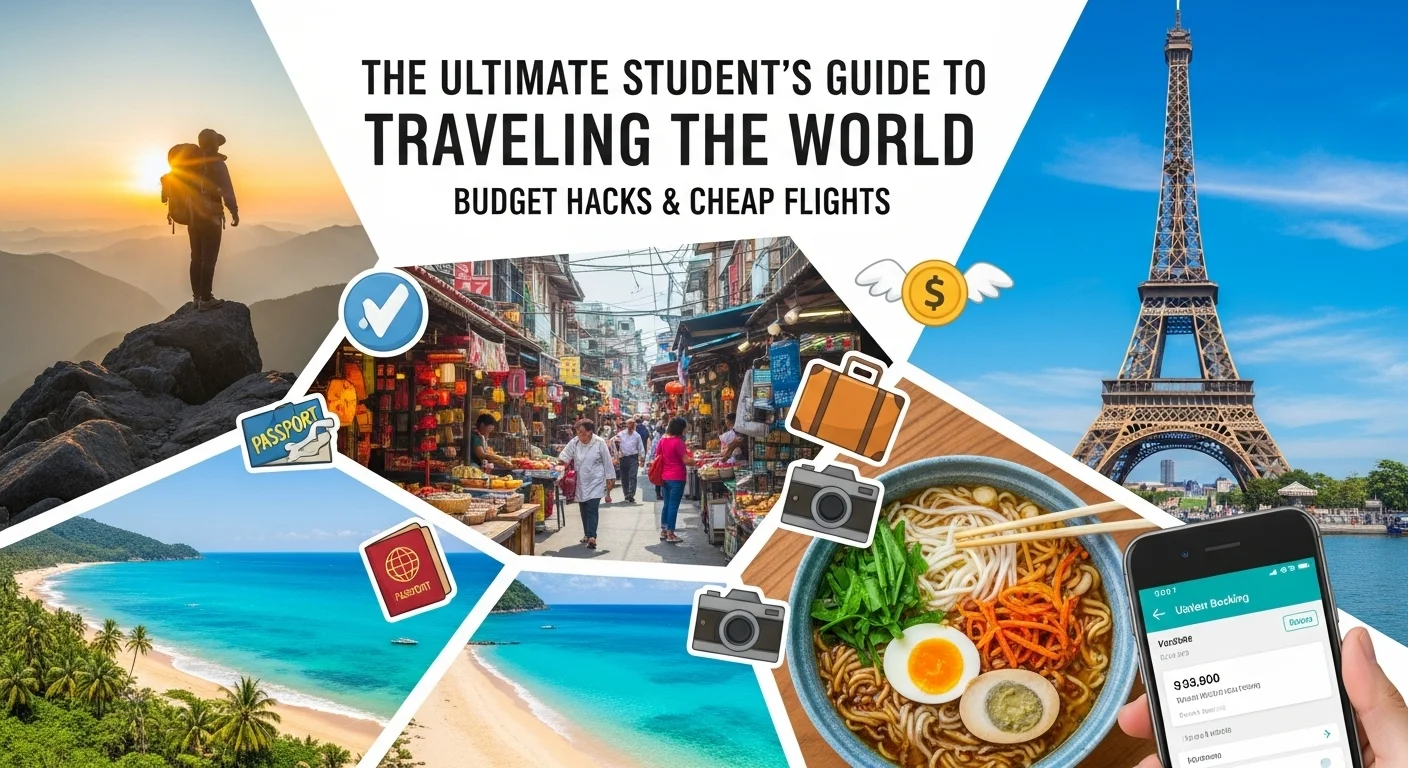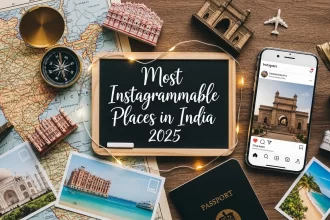Introduction: Your Passport to the World on a Student Budget
Have you ever scrolled through social media, seeing your friends’ stunning travel photos and wondered, “How can they afford that?” It’s a question that echoes in the minds of students everywhere. The idea of traveling the world often feels like a distant dream, a luxury reserved for after graduation. But what if we told you that world travel isn’t a pipe dream? With the right strategies and a little savvy planning, it’s an entirely achievable reality, even on a tight student budget. In an era where “slow travel” and purpose-driven journeys are the new gold standard, being a student traveler means you’re perfectly positioned to explore the world in a more mindful and affordable way.
This guide is your passport to making that dream a reality. We’ll show you exactly how to master the art of finding cheap flights, secure budget-friendly accommodation, and save money on the ground by living like a local. By the time you’re done reading, you’ll have a complete toolkit of budget hacks to turn that wanderlust into a tangible, unforgettable adventure.
The Art of the Cheap Flight: Booking Strategies for the Savvy Student
The cost of airfare is often the single largest expense in any travel plan, but it’s also where you can find the most significant savings. Getting your airfare right is the foundation of any successful student trip. The key is to be flexible and to think like a professional deal-hunter.
A. Mastering the Search Engine Game
The days of simply checking one airline’s website are long gone. The first step is to master the search engine game, using powerful tools like Google Flights, Skyscanner, Kayak, and Hopper. These platforms are more than just booking sites; they are your personal flight detectives. Use their “price alert” and “flexible dates” functions to track prices for your desired routes. Google Flights’ “Explore” function is particularly useful—just enter your departure city and a general time, and it will show you the cheapest destinations around the world, a truly powerful tool for those with a flexible mindset.
A timeless trick that continues to save travelers money is using incognito mode and clearing your browser cookies. While not a guaranteed fix, it can prevent websites from tracking your searches and potentially increasing the price with each visit. It’s a simple budget hack that takes seconds but could save you a significant amount.
B. The Flexibility Advantage
Flexibility is your superpower as a student. Traveling during the off-season or “shoulder season” (the periods just before and after the peak season) can save you hundreds, if not thousands, of dollars. For instance, opting for a late spring or early autumn trip to Europe allows you to enjoy pleasant weather with far fewer crowds and much lower prices. The same goes for travel dates. Flying mid-week, especially on Tuesdays or Wednesdays, is almost always cheaper than flying on weekends.
Don’t be afraid to consider less conventional destinations. While Paris and London are perennially popular, countries in Southeast Asia (like Vietnam or Thailand) or Eastern Europe (such as Albania or Romania) offer incredibly rich cultural experiences at a fraction of the cost. The latest trends for 2026 also highlight emerging hotspots like Lisbon and Budapest as top choices for those on a student budget. Embracing a layover can also be a strategic move. A longer stop might seem inconvenient, but it can make a huge difference in the final ticket price, freeing up funds for activities or food. This is particularly true for cheap flights to far-flung destinations like Tokyo, where a layover can turn an expensive journey into an affordable one.
C. Leveraging Your Student Status
Your student ID is one of your most valuable travel assets. Many airlines and booking platforms offer special student discounts. From a 50% discount on the base fare from carriers to up to 15% off with others, these are savings you should never overlook. For international travel, obtaining an International Student Identity Card (ISIC) is essential. This globally recognized card unlocks exclusive deals and discounts on flights, train passes, and even local transportation.
Finding a Bed Without Breaking the Bank: From Hostels to Homestays
After securing a great flight, the next major consideration is where to sleep. You can avoid expensive hotels and still find comfortable, safe, and authentic places to stay.
A. The Hostel Economy
The hostel economy is booming for a reason, and it’s the top choice for many backpacker and student adventurers. Hostels offer an unbeatable combination of affordability and social atmosphere. You can book a bed in a shared dorm for a fraction of the price of a hotel room, and the communal kitchens and common areas make it easy to meet fellow travelers. When choosing a hostel, always check the reviews, confirm the location is safe and central, and look for facilities like a kitchen where you can cook your own meals to further cut down on food costs.
B. Alternative Accommodation Hacks
Beyond hostels, there are countless alternative options. Couchsurfing, for instance, allows you to stay with locals for free, offering an authentic cultural exchange that money can’t buy. For those who can commit to a longer stay, house-sitting is a growing trend. You can also look into staying in university dorms during the off-season, as many institutions rent out their rooms to tourists. For solo travel, these options provide a way to connect with people and feel less alone on the road. For group trips, platforms like Airbnb can be a great way to split the cost of a private apartment, giving you more space and privacy.
Living Like a Local: On-the-Ground Budget Hacks
The key to a successful budget trip is to keep your daily spending low. This means adopting the mindset of a local, not a tourist.
A. Food & Drink
Eating out for every meal is a surefire way to drain your funds. One of the best budget hacks is to cook your own food. Many hostels and Airbnbs come with a kitchen, allowing you to buy groceries from a local market and prepare your own meals. Not only does this save money, but it also provides a unique opportunity to try local ingredients. When you do eat out, seek out local street food stalls and family-run eateries. You’ll find delicious, authentic food for a fraction of the price you’d pay at a touristy restaurant. Finally, packing a reusable water bottle is an easy way to save money and reduce plastic waste.
B. Transportation Within Cities
When navigating a new city, resist the urge to hail a cab or use a ride-sharing app. Public transport—buses, subways, and trams—are your best friends. They are not only cheap but also give you a feel for the local rhythm of life. Walking is another great option; it’s free and allows you to discover hidden gems you might have missed otherwise. For longer distances, consider taking a night bus or train. This strategy can save you the cost of a night’s accommodation and is a classic backpacker tip.
C. Activities & Attractions
The cost of attractions can quickly add up, but there are plenty of ways to enjoy a destination for less. Look for free walking tours, which are available in most major cities. They offer a fantastic overview of a city’s history and culture, and you can tip the guide what you think the tour was worth. Take advantage of free public spaces, such as parks, markets, and squares. Many world-class museums also offer free-entry days or hours, which you can easily research online. And once again, don’t forget the power of your student ID for discounted tickets to historical sites, museums, and more.
Beyond the Money: Navigating the 2025 Student Travel Landscape
The world of travel is always changing, and modern student travelers are at the forefront of new trends. In 2025, two areas are gaining significant traction: sustainable travel and the power of AI-driven technology.
A. The Rise of Sustainable Travel
Sustainable travel is no longer a niche concept; it’s a mainstream movement. For students, it’s not just about doing good for the planet but also a way to save money. Choosing eco-friendly transport, such as trains over planes for short distances, can often be cheaper. Additionally, supporting local businesses, from small-scale tour operators to family-owned restaurants, ensures your money directly benefits the community you’re visiting, creating a more authentic experience.
B. The Power of Travel Tech
Technology is more than just a tool for booking; it’s a travel companion. The latest trend in 2026 is the use of AI as a personal travel concierge. AI-powered travel apps can create entire itineraries, provide real-time updates, and suggest personalized activities based on your preferences. Just remember to double-check crucial information like visa requirements or opening hours, as AI can sometimes use outdated data. For budgeting, apps like Splitwise for sharing expenses with friends and XE Currency for up-to-the-minute exchange rates are invaluable. For staying connected, a credit card with no foreign transaction fees is a must-have. Finally, for navigation, Google Maps’ offline functionality is a lifesaver. This kind of tech simplifies your trip, giving you more time for spontaneous exploration.
Essential Tips for Students Traveling Abroad
- Traveling Light: Pack Just A Backpack With Your Essentials. It’s Better Than Dragging Heavy Luggage Around.
- Stay Connected: Either Purchase E SIM Cards Or Buy A Local SIM Card, So That You Can Access The Internet, Not All Countries Offer Free Wi-Fi Anywhere
- Track All Your Expenses: Download Applications Like Split wise or Trail Wallet So That You Can Budget and Keep Track Of What You Spend
- Safety First: Make Sure Family or Friends Always Know Where You Are, Also Make Digital Copies Of Your Important Documents So They Are Always Accessible
- Be A Good Cultural Citizen: Learn A Few Phrases In The Local Language, And, Of Course, Follow Local Etiquette.
Best Destinations for Student Travelers
- Thailand: Affordable Food, Beaches, And Culture.
- Vietnam: Affordable, Rich History, Beautiful Landscapes.
- Portugal: Great Hostels, Cheap Public Transportation, Beautiful Cities.
- Mexico: Travel Cheap, Lots Of Beautiful Food, Lots Of Culture
How to Save Money While Traveling
- Book flights at least 6–8 weeks in advance.
- Use free walking tours to check out new cities.
- Take buses or overnight trains, so you don’t have to pay for accommodations.
- Use student IDs everywhere — many museums, transport systems, and restaurants will offer discounts.
- Split expenses with fellow travelers 50/50 — taxis, meals, and accommodation.
Why Student Travel Builds Lifelong Value
Traveling as a student is not only about fun and adventure but also about learning valuable life skills. As you adapt, budget, network, and understand cultural differences, you will feel more confident, independent, and aware of the larger world. The life skills that travel continually provides rewards you contribute academically, professionally, and personally.
Conclusion: Start Your Adventure Today
The world is waiting for you, and as a student, you have the flexibility and energy to explore it in a way that many others can’t. By planning early, being flexible with your dates and destinations, and leveraging the power of technology, you can make your travel dreams a reality. This guide has provided you with a roadmap, from finding cheap flights and affordable accommodation to living like a local and embracing new travel apps and sustainable practices.
The value of student travel extends far beyond a passport stamp; it’s an education in itself. It’s an opportunity for personal growth, a chance to step outside your comfort zone and learn about cultures, people, and yourself. So, what are you waiting for? Your adventure begins now.
What’s the first destination you’ll be putting on your budget travel list?
Must Read: 15 Best USA National Parks & Natural Landscapes for Your Bucket List (2025)
FAQs (Frequently Asked Questions)
Q1. How can students afford to travel internationally?
Ans: Students can travel by using discounts, budget airlines, hostels, and volunteer programs. Careful planning and flexible itineraries reduce costs significantly.
Q2. Which countries are best for budget student travel?
Ans: Thailand, Vietnam, Portugal, Mexico, and Eastern European countries are some of the cheapest and most rewarding destinations.
Q3. Can I work abroad while traveling as a student?
Ans: Yes. Many students take part-time jobs, internships, or volunteer opportunities like WWOOF to support their travel expenses.
Q4. Is it safe for students to travel solo?
Ans: Yes, if proper precautions are taken. Choose safe hostels, keep valuables secure, and stay connected with friends or family online.
Q5. What should I pack for budget travel?
Ans: A versatile backpack, essentials like power banks, reusable water bottles, basic medicines, and lightweight clothes depending on your destination.







